Publications
Columbia University Seminar on Death has produced several edited volumes and a commemorative essay drawing on contributions from its members and associates.
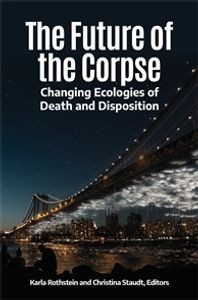
The Future of the Corpse: Changing Ecologies of Death and Disposition
Edited by Karla Rothstein and Christina Staudt (ABC-CLIO, 2021)
This book reviews the spectrum of death, from when the living person turns to corpse until the person lives in the memory of mourners, and its impact on the ecology of the sociocultural community and physical environment.
The Future of the Corpse demonstrates that American society today is in a pivotal period for re-imaging end-of-life care, funerary services, human disposition methods, memorializing, and mourning. The editors and contributors outline the past, present, and future of death care practices, pointing to promising new practices and innovative projects that show how we can better integrate the dying and dead with the living and create positive change that supports sustainable stewardship of our environment. Individual chapters describe prevailing practices and issues in different settings where people die and in postmortem rituals; disposition and current ecologically and, in urban areas, spatially unsustainable methods; law of human remains; customs and trends among key stakeholders, such as cemeteries and funeral directors; and relevant technological advances. The book culminates in a presentation of emerging sustainable disposition technologies and innovative designs for proposed public memorial projects that respond to shifting values, beliefs, and priorities among an increasingly diverse population.
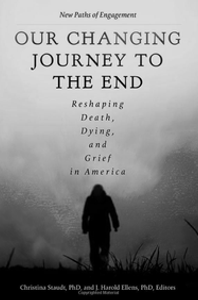
Our Changing Journey to the End: Reshaping Death, Dying, and Grief in America
Edited by Christina Staudt and J. Harold Ellens (Praeger Publishers, 2014)
What does dying with dignity mean in a diverse society with rapidly advancing technology, an aging population, and finite resources? In this fascinating collection, scholars from across the nation illuminate the remarkable changes that have taken place in recent years, are now underway, and loom on the horizon as they lead readers on an exploration of the ways Americans think about and handle dying and death. Volume 1, New Paths of Engagement, addresses changes in the circumstances and expressions of death, dying, and grief in 21st-century America. Volume 2, New Venues in the Search for Dignity and Grace, delves into the challenges inherent in creating a medical and social system that allows for an optimal end-of-life experience for all and proposes ways in which society can be reshaped to move toward that ideal.
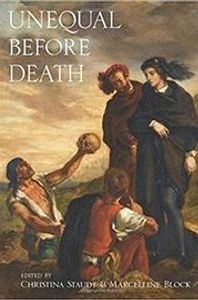
Unequal Before Death
Edited by Christina Staudt and Marcelline Block (Cambridge Scholars Publishing, 2012)
Death has been deemed the great equalizer, but each journey towards our shared, ultimate fate is unique. The length of our lives, the quality of our last days, how our deaths are perceived by others, and the handling of our remains are governed by nature and many sociocultural factors. Unequal Before Death is an edited collection that addresses inequalities surrounding death from the perspectives of scholars in a wide range of humanistic and social science disciplines, including art history, anthropology, film and media studies, political science, popular culture, psychology, religion, sociology, and statistics. The majority of the chapters of this interdisciplinary anthology are revised versions of papers presented at the second Austin H. Kutscher Memorial Conference, entitled Unequal Before Death, organized by the Columbia University Seminar on Death in March 2010 and attended by leading experts in academia, healthcare and the not-for-profit sector. The purpose of this volume is to bring attention to the many inequalities affecting the end of life experience and to encourage collaborative research and action that can improve the experience for the dying and those around them. This volume does not question the truism of death as the ultimate equalizer but rather, seeks to explore the many ways in which the final journey is not equal.
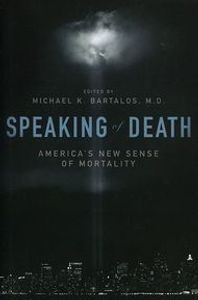
Speaking of Death: America’s New Sense of Mortality
Edited by Michael K. Bartalos, M.D. (Praeger Publishers, 2009)
In the post-9/11 moments, months, and years, America has come to develop a new mortality awareness. Death, and our understanding that it can be sudden and is certainly inevitable, is being talked about more than ever before. As the team in this volume shows through groundbreaking research, surveys, interviews, and vignettes, death awareness has grown strong, and has changed the way we think and act, not only in relation to ourselves and our loved ones, but in relation to society overall. Those changes include nuances from increases in the number and size of college courses focused on death, rapid growth of death books, death photography, television shows dealing with death, as well as the recording and dissemination of death videos from those that show family members dying peacefully to the execution of terrorists or their captives. Impromptu street creations to memorialize common people who have died have emerged, as have new ways to dispose of dead bodies, including blasting ashes into space or placing them under the sea or giving them a green resting place in a natural forest. Our means of grieving, coping, and beliefs about afterlife have been altered, too.
This work also includes a look at cosmologists and physicists who have revised their theories on humanity’s legacy when our world meets a fateful end, who propose a means by which mankind’s achievements might survive indefinitely, transporting from one universe to another without violating the known laws of physics. This book will intrigue all with an interest in considering not only death and how 9/11 changed America’s views on and beliefs about it, but also considering what could lie beyond that end for all of us.
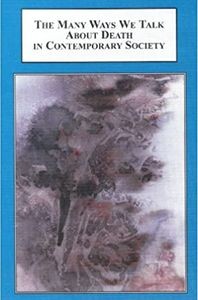
The Many Ways We Talk About Death in Contemporary Society: Interdisciplinary Studies in Portrayal and Classification
Edited by Margaret Souza and Christina Staudt (Mellen Press, 2009)
This interdisciplinary collection examines the representation of death in traditional and “new” media, explores the meaning of assassination and suicide in a post 9/11 context, and grapples with the use of legal and medical tools that affect the quest for a “good death.” The contributors treat their interrelated topics from the perspective of their expertise in medicine, law, psychology, anthropology, sociology, political science, religion, philosophy, literature, media, and visual culture. The essays are based on papers presented at the Columbia University Seminar on Death's 2008 conference, “The Pulse of Death Now.”
Columbia University Seminar on Death contributed a commemorative essay describing its fifty years of history titled "Speaking About Death," by Christina Staudt, Joseph W. Dauben, and John M. Kiernan, with Members and Associates of the Columbia University Seminar on Death. The essay appears in the following collection:
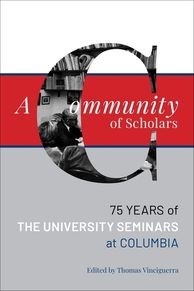
A Community of Scholars: Seventy-Five Years of The University Seminars at Columbia
Edited by Thomas Vinciguerra (Columbia University Press, 2021)
A Community of Scholars is a seventy-fifth anniversary celebration of the founding of the University Seminars. It brings together essays by seminar chairs and other leading participants that exemplify the diversity and vibrancy of these proceedings. Their topics are wide-ranging—the evolution of the labor movement, urban life, the politics and culture of Brazil, the Enlightenment, the prospects for world peace—but in each, a commitment to intellectual provocation and shared learning is on full display. An informative introduction explains how the Seminars came into being and why they continue to matter. The volume also features biographical sketches of Frank Tannenbaum, the Latin America scholar and criminologist who founded the Seminars, and his wife, the anthropologist Jane Belo, a close friend of Margaret Mead. Belo and Tannenbaum endowed the Seminars and allowed them to flourish. A remarkable testament to an unparalleled intellectual forum, A Community of Scholars allows readers to share in the eclectic spirit of the Seminars.